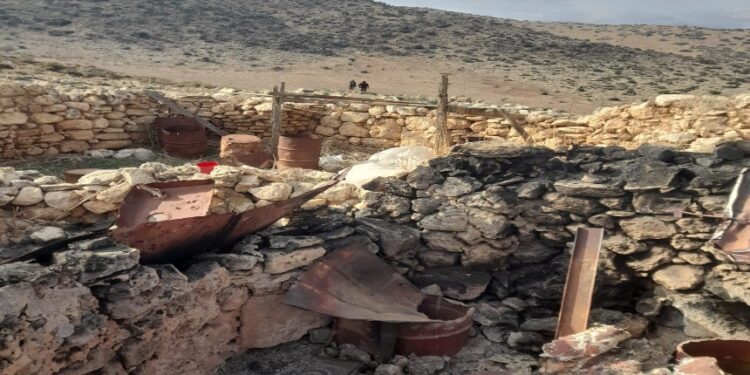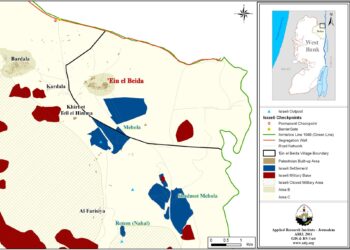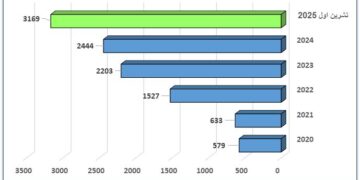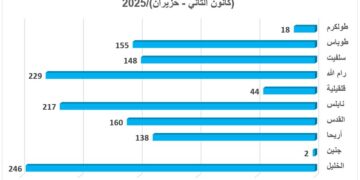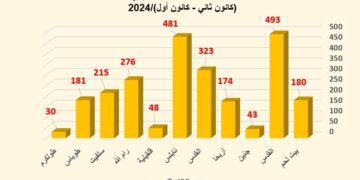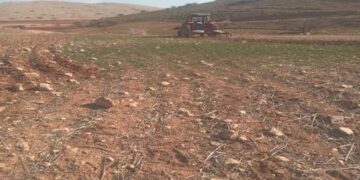At the edge of the northern Jordan Valley, the village of Ein al-Beida represent a case model of the ongoing Palestinian suffering under Israeli occupation. Located some 15 kilometers to the east from the city of Tubas, the village faces constant threats of the systematic policies aimed at forcibly displacing its residents, tearing the community down in their economic and social aspects, and replacing them with the illegal Israeli settlements.
A Village under Siege
Ein al-Beida occupies a strategically sensitive location, bordered by the “Mehola” settlement on one side and the Jordan River on the other. This positioning exposes it to constant Israeli control, whether through military checkpoints like the “Tayasir” checkpoint or through settlement expansion that appropriates its lands.
The village is home to approximately 3,000 residents who lives a daily restrictive conditions imposed by occupation policies. Among them, over 70% are women, and 25% are children, making them particularly vulnerable to the psychological and social repercussions of ongoing assaults, including the repeated attacks from the Israeli settlers.
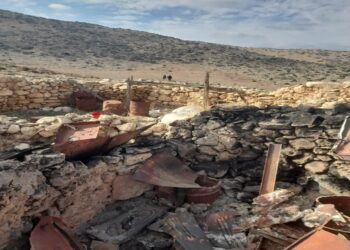 The attacks on Magda Fuqha Family
The attacks on Magda Fuqha Family
The story of the family of Mrs. Magda Shukri Saleem Fuqha exemplifies the daily hardships faced by Ein al-Beida’s residents. The family owns a cattle farm, their primary source of income, which has been the target of systematic attacks aimed at destroying this critical resource. The attacks intended to target directly and destroy the infrastructure of the cattle farm as the Israeli forces have repeatedly damaged parts of the farm and conducted military drills nearby, rendering the area unsafe. The Israeli authorities also imposed a $2,000 fine on the family and banned them from accessing their farm under the pretext of it (the farm) is located in a “closed military zone.”
The violations against Magda and her family went beyond property destruction to include the confiscation of 25 cows in September 2024. The Israeli military claimed the livestock had wandered into a nearby military base during grazing and refused to return them. This led to the death of many cows due to lack of food, leaving the family with only ten cows and financial losses exceeding $140,000.
The Israeli Settler Violence is another aspect of what the family and the community goes through as the Israeli settlers who act with impunity, have systematically burned feed supplies, physically assaulted family members, and issued ongoing threats, creating an atmosphere of fear designed to force the family off their land.
Economic and Social Impact
These various types of assaults that Magda, her family and community face have far-reaching consequences that go beyond economic loss, deeply affecting the social and psychological wellbeing of the family and the village’s residents. Since 2000, the lack of security and safety for life and ram of economic aspects has driven ten families from the area in search of better living conditions.
The youth, representing the village’s future, face significant challenges, with many choosing not to stay or settle in Ein al-Beida due to limited prospects and the absence of safety. Women and children, being the most affected, suffer severe psychological harm from the hostile environment, undermining the community’s resilience and even endurance.
A Systematic Policy of Forcible Displacement
The bottleneck situation of Ein al-Beida is not an isolated incident but part of a deliberate Israeli strategy aimed at forcibly displacing Palestinians. This policy focuses on dismantling infrastructure, restricting access to livelihoods, and infusing fear and anxiety among the population, thus realizing the ultimate objective of these measures, which is to expand illegal settlements and annex Palestinian land.
Such actions are in blatant violation of international law, which prohibits the forcible displacement of populations under occupation and condemns the destruction of private and public property and livelihood as means of civilian coercion.
A Call for Action and Solidarity
Ein al-Beida, like many other Palestinian villages, urgently requires intervention from the international community and human rights organizations to halt all forms of Israeli violations. Increased global pressure on Israel is necessary not only to stop these assaults but also to ensure the protection of residents and enable them to live with dignity on their land.
The story of Mrs. Magda Fuqha’s family and the broader challenges facing Ein al-Beida offer a glimpse to the tip of the Palestinian struggle in the northern Jordan Valley. This daily tragedy demands genuine and effective action at both local and international levels against attempts at the displacement and the eradication of the community and it likes, and also to ensure its resilience and endurance.
**************************************************************
Prepared as part of the project:
“Mapping and Diagnosing Palestinian Rural Women’s Livelihood and Economic Empowerment in Area “C”
Implemented by: The Applied research Institute-Jerusalem (ARIJ)
Prepared by:
The Applied Research Institute – Jerusalem


